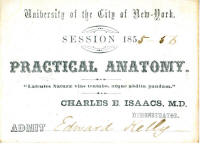Charles E. Isaacs, M.D.
Click on image to enlarge
Go here for the lecture card display
Charles E. Isaacs, M. D., died in Brooklyn, N. Y., June 16, 1860.
Dr. Isaacs was born at Bedford, Westchester Co., June 24, 1811. At twelve, we are told that he read the Greek Testament with facility, and at an early age he delighted in collecting specimens from the animal, vegetable, and mineral kingdoms. These tastes were fortunately indulged. Selecting medicine as a profession, he studied with Dr. Belcher, of New York, graduated at the University of Maryland in 1832 ; was subsequently appointed surgeon, during General Jackson's administration, to accompany the Cherokee Indians in their removal beyond the Mississippi, and travelled quite extensively among the Indian tribes, and through the Southern States. He entered the army in 1841, being first among the six who passed, out of fifty candidates. After acting with credit on various stations, he obtained leave of absence in 1846, about that time resigned, and in connection with a friend, established a medical class in Greene St., N. Y. At the end of a year he left, went to Niagara Co., there again embarked in private practice, apparently without success, as in another year we find him again in New York, and becoming attached to the hospitals on Staten Island. Subsequently he was made Demonstrator of Anatomy in the College of Physicians and Surgeons of New York, which post he held for several years, and still later became attached to the New York University Medical College in the same capacity. During the warm seasons he was employed on various European steamers, and visited the hospitals of Paris and other foreign cities. In 1856, now in his forty-sixth year, he went to Brooklyn, and at once obtained a wide and lucrative medical practice, which he had enjoyed, however, for the short period of three years only, when death removed him from the scene of his usefulness.
Dr. Isaacs was an excellent anatomist, and was fond of investigations in physiology and pathology, as exhibited in his monograph on the structure and functions of the kidney (See Trans. N. Y. Acad. of Med.). an article highly commended both at home and abroad. His death was due to an attack of pleuro-pneumonia, although he had previously been affected with various disorders, of which the groundwork had been laid by early exposure in malarious climates. Few men have died more honored and beloved by the profession, as well as by those with whom he came in contact. (See Ami-r. Med. Times, vol. i.)
